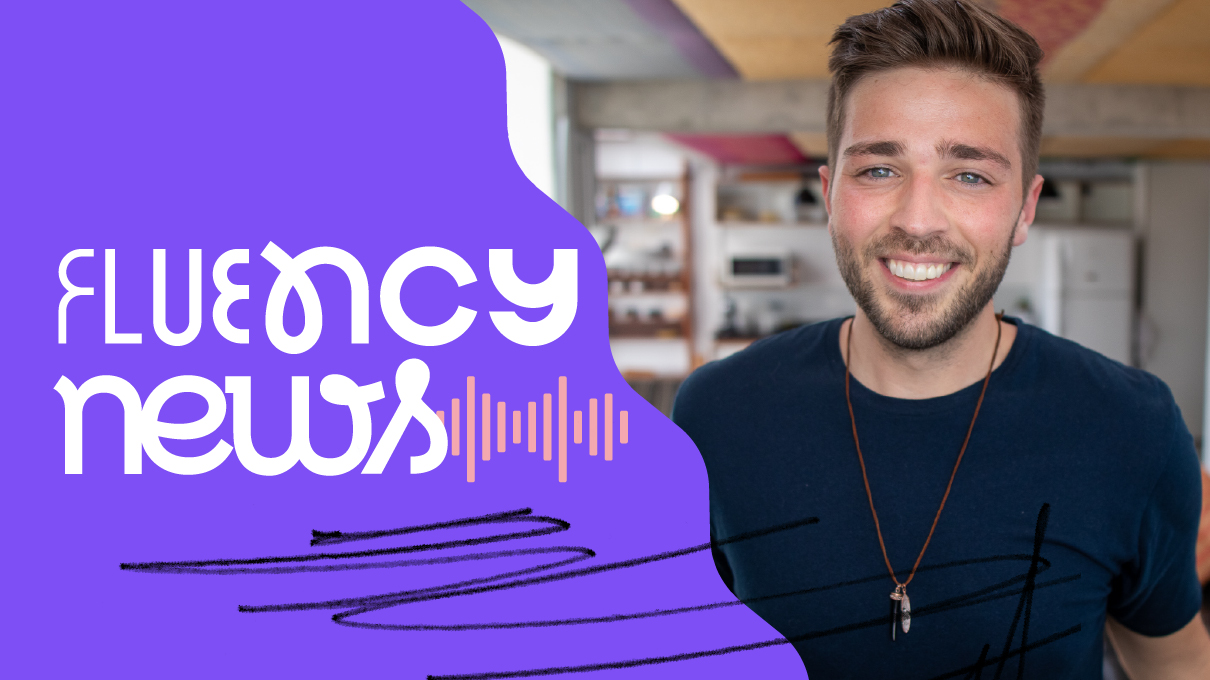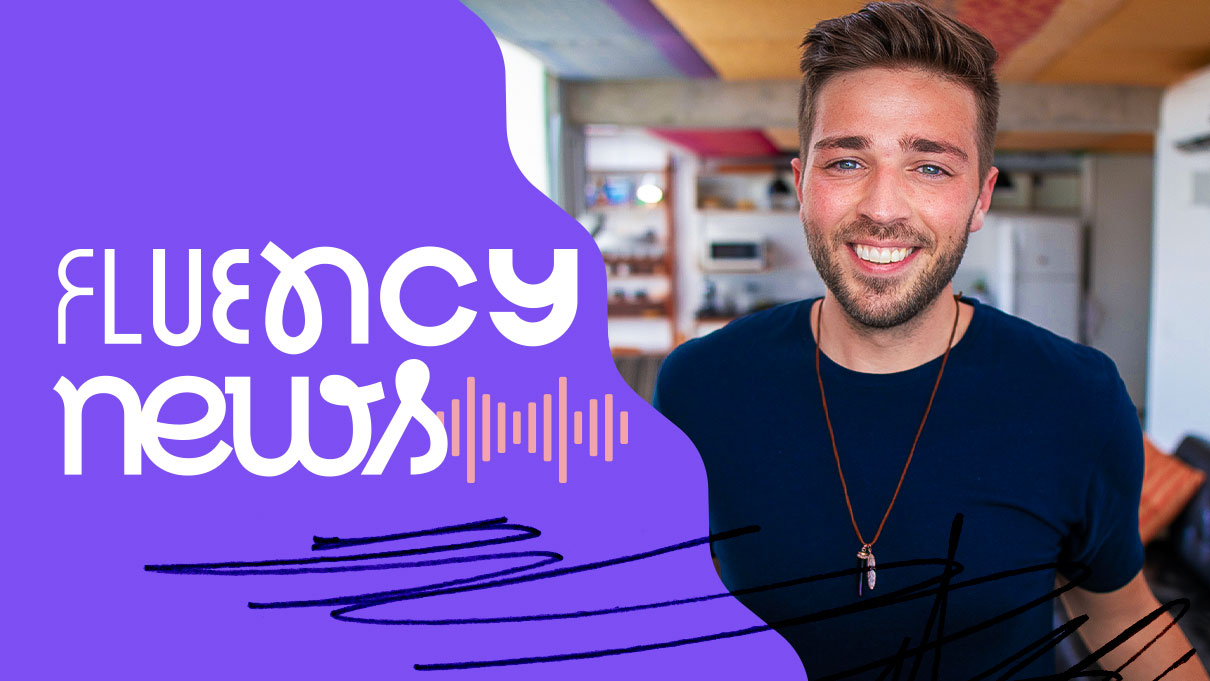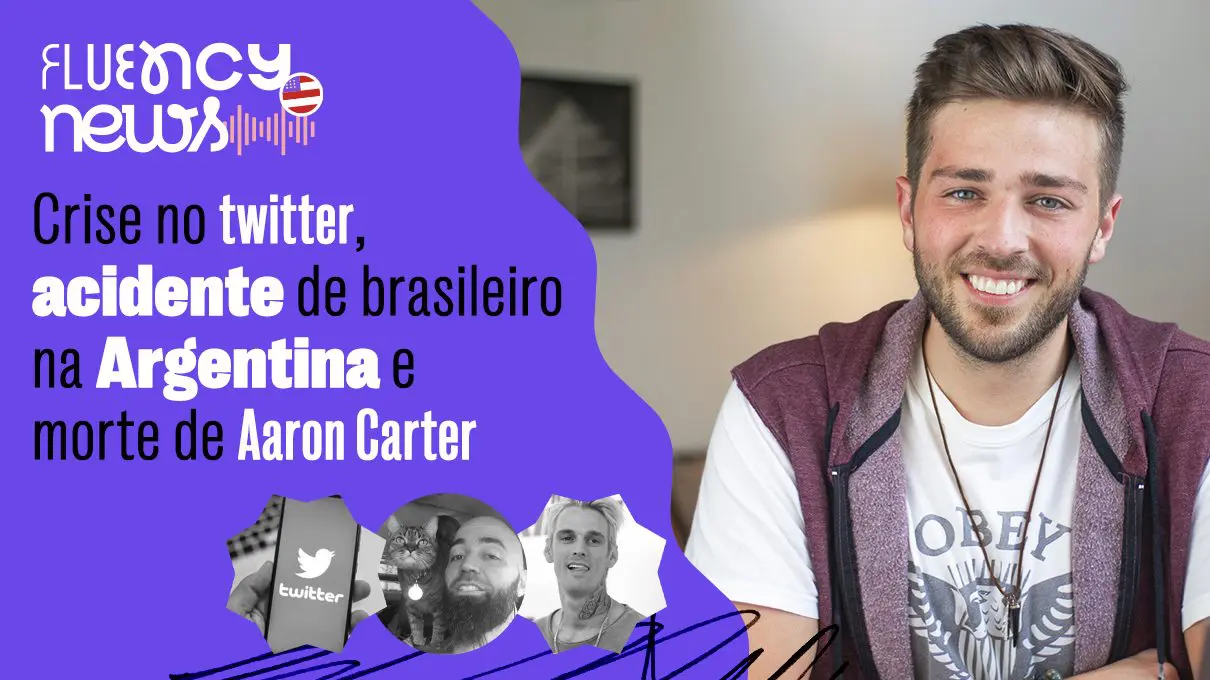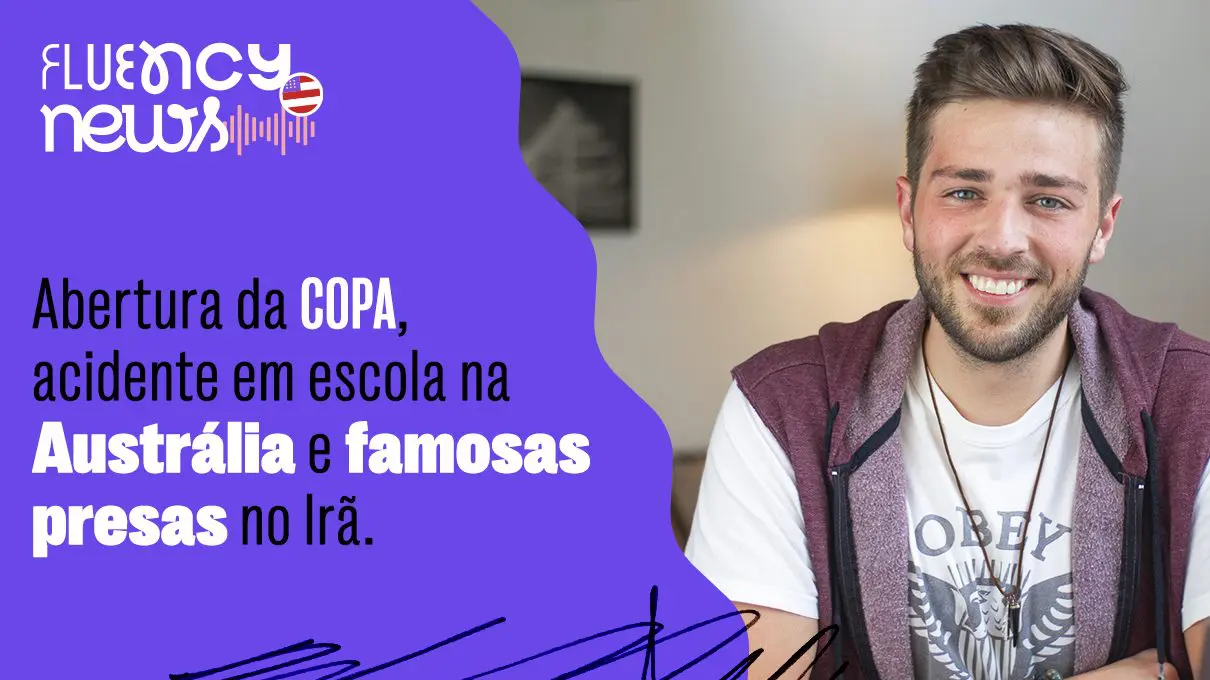Fluency News 03

Hello, everyone! Sejam bem-vindos e bem-vindas a mais um episódio da nossa nova série de podcasts, o Fluency News! Aqui, você vai treinar a sua escuta e ficar por dentro do que está acontecendo no mundo, sempre com as três principais notícias da semana, tudo em inglês! Ao longo do episódio, nós também adicionamos explicações […]
Hello, everyone!
Sejam bem-vindos e bem-vindas a mais um episódio da nossa nova série de podcasts, o Fluency News! Aqui, você vai treinar a sua escuta e ficar por dentro do que está acontecendo no mundo, sempre com as três principais notícias da semana, tudo em inglês! Ao longo do episódio, nós também adicionamos explicações em português das coisas que achamos que precisam de mais atenção, assim você não perde nenhum detalhe!
Esta semana, falamos sobre os incêndios na Califórnia, o primeiro caso confirmado de reinfecção pelo coronavírus e os esforços globais para criar uma vacina contra o vírus que já matou mais de 800 mil pessoas no mundo todo.
Continue lendo para ter acesso a uma seção de expansão de vocabulário para maximizar o seu aprendizado!
TRANSCRIÇÃO DO EPISÓDIO
What is up, guys! I’m Scott Lowe and welcome back to another episode of Fluency Academy’s Fluency News. This podcast is made for you to train your English and keep yourself an informed citizen of the world! Presented by me, Scott, professor da Fluency Academy, americano de corpo brasileiro de alma.
First of all, another super thank you for all the positive feedback on our previous 2 episodes. It was great seeing so many of you visited fluencytv.com to check out the extra material that accompanies these episodes, it was our highest accessed page last week on the site! We hope you’ll love this episode too!
Today again we’ll present to you three of the week’s biggest news stories today, 99% in English, for you to train your listening and comprehension. We’ll also add a few quick explanations in Portuguese here and there in parts that we think deserve special attention!
Let’s get started! Today’s first story revolves around the California wildfires.
Among worst in California history, fires blaze across the San Francisco Bay area, Napa wine country as firefighters battle the flames.
More dry-lightning storms hit Northern California on Monday after sparking more than 625 wildfires the past week, but firefighters got some relief as temperatures eased off record highs.
The worst of the blazes, including the second and third-largest in California history, burned in the San Francisco Bay Area with roughly 240,000 people under evacuation orders or warnings across the state.
Much of North California, including the Sierra Nevada Mountains and coast, was under a “red flag” alert for dry lightning and high winds, but the National Weather Service dropped its warning for the Bay Area.
Close to 300 lightning strikes sparked 10 blazes overnight and more “sleeper fires” were likely burning undiscovered in areas shrouded by dense smoke, Governor Gavin Newsom said on Monday.
One huge blaze burned in ancient coastal redwood forests south of San Francisco that have never seen fire due to usually high relative humidity levels, Newsom said.
“We are in a different climate and we are dealing with different climate conditions that are precipitating fires the likes of which we have not seen in modern recorded history,” Newsom told a news briefing.
The wildfires, ignited by more than 13,000 lightning strikes from dry thunderstorms across Northern and Central California since August 15, have killed at least seven people and destroyed more than 1,200 homes and other structures.
Smoke from wildfires that have burned more than 1.2 million acres, an area more than three times larger than Los Angeles, has created unhealthy conditions for much of Northern California and drifted as far as Kansas.
“I’m nervous; I don’t want to leave my house, but lives are more important,” Penny Furusho told CBS television affiliate KPIX5 after she was told to evacuate from the south flank of the SCU fire.
In just a week, the LNU Lightning Complex became the second-largest by size in recent California history, followed by another fire – the SCU Lightning Complex fire that has burned into seven counties and is just 15% contained.
More than 14,000 firefighters are on the wildfires, with 91 fire crews traveling from seven states and National Guard troops arriving from four states, Newsom said.
Aided by weather and reinforcements, firefighters were cautiously optimistic as they struggled to control California wildfires that have killed at least seven and burned more than 1,200 homes and other buildings.
Officials said progress was made against the CZU Lightning Complex in San Mateo and Santa Cruz counties with the help of rain on Sunday evening and calmer weather on Monday.
“With the increase in humidity, the fire has actually extinguished itself,” Cal Fire Operations Chief Mark Brunton told a news briefing.
“With the clear air, we were able to fly a lot more aircraft,” he continued.
Helicopters dropped 200,000 gallons of water on the blaze, he said, calling it “the best day yet”. In addition to better weather, fire crews along with bulldozers and other equipment were arriving from other states.
“I think we’re going to have more days like this and hopefully get us closer to the end of suppressing this fire,” Brunton said.
But officials warned the danger was far from over and admonished residents to stay out of evacuated areas. Six people who returned to a restricted area south of San Francisco were surprised by fire and had to be rescued, the San Mateo sheriff said. Looters have been warned they will be arrested and some people have been taken into custody, including a man found with $5,000 in his car, authorities said.
Evacuees tempted to check on their homes should think again, officials said.
“It is highly dangerous in there still,” Jonathan Cox, a Cal Fire deputy chief, said of the blaze north of Santa Cruz. “We have bridges that have failed, old wooden bridges that have failed that may not appear failed to people, that they may drive on. It is not safe.”
An estimated 170,000 are under evacuation orders and tens of thousands of homes remain under threat. Some orders were reduced to warnings on Monday.
Elinor Slayer fled her home in the redwood-dotted mountain town of Boulder Creek, north of Santa Cruz, on Tuesday evening, along with her four children, when they started seeing burnt leaves and large pieces of ash.
“Luckily for me, I have a 13-year-old daughter who is very cautious about wildfires. We had bags packed already,” said Slayer, 48. “We hadn’t gotten an evacuation order yet but my daughter said, ‘It’s time to go.”’
The family is counting their blessings that everyone is safe and hoping their home is too.
“We don’t know what we’re going to return to,” Slayer said.
The siege of wildfires in the state has been astonishing, especially since peak fire season usually is during the hot, windy days of September and October.
“We are dealing with different climate conditions that are precipitating in fires the likes we haven’t seen in modern recorded history,” Mark Brunton, operations chief with the California department of forestry and fire protection, or Cal Fire, said.
No começo da nossa primeira história, eu falei que havia a possibilidade de “sleeper fires” ainda não terem sido descobertos. Se traduzirmos literalmente, “sleeper fire” significa “fogo dormente”. Mas o que é que isso significa de verdade? Sleeper fire é o fogo que fica latente, ardendo em fogo lento. Se não identificado logo, esse fogo torna-se uma chama, que cria uma labareda de fogo, tornando o processo de extingui-lo muito mais difícil. Em inglês, nós definiríamos isso como a forest fire that smolders for some time before bursting into a blaze
Now we move to our second story of today. Hong Kong has the first confirmed case of coronavirus re-infection.
Researchers in Hong Kong say they have documented the first instance of a man who was reinfected after first contracting the novel coronavirus more than four months ago.
The researchers at the University of Hong Kong on Monday said their findings indicate the disease, which has killed more than 800,000 people worldwide, may continue to spread globally despite developing herd immunity.
The 33-year-old male was cleared of COVID-19 infection and discharged from a hospital in April, but tested positive again after returning from Spain via the United Kingdom on August 15.
The patient had appeared to be previously healthy, researchers said in the paper, which has been accepted by the international medical journal Clinical Infectious Diseases.
He was found to have contracted a different coronavirus strain from the one he had previously contracted, and remained asymptomatic during the second infection.
The finding suggests that some patients who recover from COVID-19 may have only short-lived immunity to reinfection.
“The finding does not mean taking vaccines will be useless,” Dr Kai-Wang To, one of the leading authors of the research paper, told the Reuters news agency.
“Immunity induced by vaccination can be different from those induced by natural infection,” To said. “We will need to wait for the results of the vaccine trials to see how effective vaccines are.”
The researchers suggested the patients, who have recovered after getting coronavirus, should also wear masks and maintain physical distancing.
In response to the Hong Kong case, the World Health Organization (WHO) epidemiologist Maria Van Kerkhove on Monday said there was no need to jump to any conclusions.
Instances of people discharged from hospitals and testing positive again for COVID-19 infection have been reported in mainland China.
However, in those cases, it was not clear whether they had contracted the virus again after full recovery – as happened to the Hong Kong patient – or still had the virus in their body from the initial infection.
The preliminary number of patients in China who tested positive again after being discharged from hospital was 5-15 percent, Wang Guiqiang, an infectious disease specialist in China’s expert group for COVID-19 treatment, said during a press briefing in May.
One explanation was that the virus still existed in the lungs of patients but was not detected in samples taken from upper parts of the respiratory tract, he said, adding that other possible causes were low sensitivity of tests and weak immunity that could lead to persistent positive results.
Jeffrey Barrett, an expert and consultant with the COVID-19 Genome Project at the UK’s Wellcome Sanger Institute, said in emailed comments to Reuters that it was very hard to make any strong inference from a single observation.
“Given the number of global infections to date, seeing one case of re-infection is not that surprising, even if it is a very rare occurrence,” he said.
Quando estamos falando de notícias, normalmente usamos a voz passiva, como eu já falei em um episódio, e usamos o present perfect, você se lembra? O certo é que independente disso, usamos, com ainda mais frequência o passado simples. Estamos sempre falando de coisas que já aconteceram, por isso os verbos estão quase sempre na sua forma passada. Para os verbos regulares, como walk, talk, happen, induce e recover, por exemplo, nós só adicionamos as letras ED no final. Os verbos irregulares não seguem uma regra, por isso podem ser mais difíceis de lembrar. Você pode tentar usar uma lista para decorar, mas para muita gente, esse método não funciona. O melhor é consumir a maior quantidade de conteúdo do idioma possível, para que o seu cérebro faça conexões sem você ter que memorizar uma lista de verbos soltos. Se você quiser conferir uma lista desses verbos irregulares, você pode dar uma olhada na descrição em fluencytv.com, onde você vai encontrar material de apoio para este episódio.
Still on the virus subject, the World Health Organization says 172 countries are engaging with a global covid-19 vaccine plan.
Some 172 countries are engaging with the COVAX facility designed to ensure equitable access to COVID-19 vaccines, the World Health Organization said on Monday, but more funding is needed and countries need now to make binding commitments.
Countries wishing to be part of the global COVAX plan have until Aug. 31 to submit expressions of interest, WHO officials said, with confirmation of intention to join due by Sept. 18, and initial payments due by Oct. 9.
WHO director general Tedros Adhanom Ghebreyesus [now that’s a mouthful] said the facility was critical to ending the COVID-19 pandemic, and would not only pool risk for countries developing and buying vaccines, but also ensure prices are kept “as low as possible”.
“Vaccine nationalism only helps the virus,” he told a media briefing. “The success of the COVAX facility hinges not only on countries signing up to it, but also filling key funding gaps.”
COVAX is co-led by the GAVI vaccines alliance, the WHO and the CEPI, Coalition for Epidemic Preparedness Innovations, and is designed to guarantee equitable access globally to COVID-19 vaccines once they are developed and authorised for use.
It currently covers 9 candidate COVID-19 vaccines and its aim is to secure supplies of and deliver 2 billion doses across countries that sign up by the end of 2021.
“Initially, when there will be limited supply (of COVID-19 vaccines), it’s important to provide the vaccine to those at highest risk around the globe,” Tedros said.
He said this included health workers on the front lines of the pandemic, who were “critical to saving lives and stabilising the overall health system”.
Algumas vezes nessa notícia, eu usei a palavra equitable. Você sabe o que ela significa? Se traduzida literalmente, ela significa “equitativo”, que não é uma palavra muito utilizada no português, certo? O que ela significa de verdade, é “justo”, “justa”, no sentido de ser igual para todos. Quando dizemos equitable access globally, estamos dizendo que a junta quer que o acesso global dessa vacina seja justo e igual para todos os países.
And in good news, Africa is to be declared free of wild polio after decades of work.
Achievement comes following Nigeria vaccination drive, with last cases of wild virus recorded four years ago.
Africa is expected to be declared free from wild polio, after decades of work by a coalition of international health bodies, national and local governments, community volunteers and survivors.
Four years after the last recorded cases of wild polio in northern Nigeria, the Africa Regional Certification Commission (ARCC) is expected to certify that the continent is free of the virus, which can cause irreversible paralysis and in some cases death.
The achievement is the result of a campaign to vaccinate and monitor children in Borno State, the final front of polio eradication efforts on the continent, and the heart of the jihadist insurgency in Nigeria.
“It’s been a momentous, massive undertaking, with amazing persistence and perseverance, coming in the face of moments when we thought we were just about there, then we’d have a reversal,” Dr Matshidiso Moeti, the World Health Organization (WHO) regional director for Africa, said.
The WHO, she said, had played a central coordinating role within the Global Polio Eradication Initiative – a coalition of national governments and local leaders, working with Unicef, the Bill and Melinda Gates Foundation, Rotary International, the US Centers for Disease Control and Prevention – and with millions of community volunteers across the continent.
Improved surveillance, tackling violent levels of vaccine scepticism that fuelled deadly attacks on health workers and the inclusion of polio survivors within eradication teams were key factors in wiping out the virus, said Moeti.
“I would really like to pay tribute to polio survivors, who have joined in the fight, who have helped in sharing their experiences of disability with polio and the impact this has had on their lives,” she said.
In 1996, 75,000 children in Africa were paralysed by polio.
The fight now is to improve the lives of survivors, said Moeti.
“This moment underlines the importance of paying attention and better prioritising the needs of people with disabilities in the African region. Health is not just the absence of a disease that can kill, it is a complete sense of wellbeing,” she said.
Musbahu Lawan Didi, co-founder of Nigeria’s Association of Polio Survivors, campaigning for the rights of those with polio , said: “It is incredible that what we have started years ago has built these results. As polio survivors we are the happiest and believe we’ll be the last polio survivors in the country.”
But he added: “Ninety percent of polio survivors in Nigeria live in poverty. Many of us are trawling the streets to survive, begging. It should not be so.”
Dr Rose Leke, chair of the ARCC, an independent body set up by the WHO, said the declaration followed exhaustive assessments of surveillance systems in 47 African countries to ensure no cases were missed
Despite the progress, however, 16 countries in the region are currently experiencing small outbreaks of vaccine-derived polio, which can occur among underimmunized communities.
Efforts to eradicate wild polio globally were spurred by the formation of the Global Polio Eradication Initiative in 1988. Since then, cases of wild polio have fallen dramatically from an estimated 350,000 cases to 33 reported cases in 2018. In Africa, a campaign by leaders from the continent, led by Nelson Mandela, helped drive progress.
But the insurgency in northern Nigeria made the disease hard to shift. In 2013, nine women who were vaccinating children in Kano were shot dead by gunmen suspected of belonging to Boko Haram.
At least 67 frontline health workers involved in polio eradication efforts in the region have been killed, with others attacked and abducted.
Several violent incidents were spurred by a rejection of vaccinations by local communities, said Dr Tunji Funsho, head of Rotary International’s Nigeria polio committee.
“A challenge was insidious rumours that the vaccine is not safe, that it could lead to HIV, Aids, could sterilise women with a view to reduce the population in the northern part of the country,” he said. Suspicion of western aligned medical initiatives, and of efforts to suppress Muslim majorities caught alight in the region.
In July 2003, five states in northern Nigerian suspended the use of polio vaccinations for at least a year. Annual cases in Nigeria then soared, with Nigerian strains of the virus spreading across Africa.
The bitter legacy of controversial medical trials for other diseases in northern Nigeria also fuelled opposition to vaccinations.
But a big effort to appeal to political, community and religious leaders, along with public campaigns and town hall meetings began a gradual turnaround.
In 2015, President Muhammadu Buhari was televised personally administering oral vaccine drops to one of his grandchildren.
“The sad thing is that some rejections are not just because they don’t believe in the polio vaccine, but they have … needs that come first,” said Funsho. For example, polio vaccinations take precedence over healthcare for more fatal diseases like malaria.
“So refusing vaccines becomes a kind of protest against the government,” he said, explaining that it was a way of impressing the need for greater investment in healthcare.
He said in some cases, fathers refused vaccines for their children because they were too ashamed to reveal their children had not eaten and were fearful it would induce a reaction. “We’ve had to make sure we really understand and listen to people’s needs and concerns,” Funsho said.
The increased involvement of polio survivors over the past decade was crucial to addressing the concerns from local communities, said Lawan Didi, who was diagnosed with polio when he was two. “People saw us, and communicated with us. We could explain to them this is not a spiritual thing, but can be prevented with vaccines. It gave them a change of heart.”
Você sabia que a palavra “free” tem mais de um significado? Pode ser que você já tenha escutado essa palavra com o sentido de “gratuito”, “de graça”. Mas, como você viu nessa notícia, ela também pode significar “livre”. Quando dizemos que a África pode ser declarada “free of polio”, estamos dizendo que ela está sendo declarada livre dessa doença, que os casos são poucos e a doença pode ser erradicada.
Isn’t that an awesome use of that word and even more awesome news?
And with that, we’re done! As always, you can find the sources to all our stories in the description of this episode or on fluencytv.com. Be sure to check out fluencytv.com for more free content, tune back in to hear the main stories around the world, and get some snippets of explanations to expand your knowledge and practice your listening skills. There’s a new episode of Fluency news every week and I’ll see you on the next episode. Peace out.
Sources:
https://www.aljazeera.com/news/2020/08/200824213511636.html
Playlist









































































































































